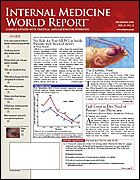Cell Phones, Antidepressants Bad for Your Sperm
From the American Society for Reproductive Medicine
NEW ORLEANS—Two studies presented at the American Society for Reproductive Medicine meeting suggest that 2 staples of modern life—cell phones and antidepressants—may have negative impacts on sperm.
The Cell Phone Connection
In an observational study, the frequency of cell phone use was found to affect all aspects of a man’s sperm profile. The study included 364 men (average age, 32 years) who were undergoing evaluation for infertility. Among men with normal sperm counts, those who did not use a cell phone at all had sperm counts averaging 86 million/mL, with 68% motility and 40% normal morphology. Among men who used a cell phone >4 hours/day, these parameters were significantly lower: 66 million/mL, 48% motility, and 21% normal morphology, reported Ashok Agarwal, PhD, director of the Andrology and Reproductive Tissue Bank, Glickman Urological Institute, Cleveland Clinic, Ohio.
“Cell phones have been associated with a variety of effects on the body, such as increased blood pressure, reduced melatonin, DNA strand breaks, headache, fatigue, difficulty concentrating, and alterations in EEG [electroencephalogram] and sleep patterns. Their effect on fertility, however, has not been well studied,” he said.
The men were randomized into 4 usage groups, and 9 semen parameters were examined. The analysis showed significant differences in several of these parameters according to frequency of use, with men who spent the most time talking on cell phones showing the greatest decrements in sperm quality (Table).
“In nonusers compared with highest users, several parameters were reduced by 30% to 50%,” Dr Agarwal reported. “We don’t have a firm hypothesis as to what is happening, but it could be that electromagnetic waves are causing Leydig cell injury, or causing an increase in tissue temperature, which could affect spermatogenesis. There might also be decreases in melatonin, which predisposes sperm to oxidative stress and cell damage.”
Dr Agarwal acknowledged that men could be exposed to electromagnetic waves from other sources, including laptop computers, radio towers, hand-held personal digital assistants, and so forth, and that cell phone models might differ in their emissions. Ongoing studies are looking at both transmission in silent mode, time of possession of the cell phone, and exposure from other devices.
“Our message is simply that cell phone use in men is associated with decreases in sperm quality, though the mechanisms are unclear at this point. It would be premature to recommend cutting back on cell phone use at this time,” he said.
Antidepressants and Infertility: Case Reports
In another study featured at the meeting, investigators reported on 2 patients whose semen parameters improved markedly when they discontinued antidepressant medications, specifically selective serotonin reuptake inhibitors (SSRIs). Although this scenario has been observed in about 10 patients, these were the 2 most definitive cases.
Cigdem Tanrikut, MD, of Cornell Medical Center, New York City, said, “We have observed that several men with infertility of unclear etiology showed marked improvements in semen parameters when they discontinued SSRIs. Specifically, they had impairments in sperm motility and low sperm concentration while on treatment, but these improved within 1 month of stopping the SSRI. Based on the time course of improvement, we believe there is a possible relationship between SSRI effects and changes in semen.”
Aside from the markedly compromised semen quality, the patients were otherwise normal, and their female partners were not infertile.
“We know that the ejaculatory reflex is affected by serotonin and SSRIs, which are used to treat premature ejaculation. Because of the temporal association, we speculate that SSRIs may also have an independent effect on sperm transport, resulting in impaired sperm motility and concentration for some patients,” she explained.
A controlled study is being planned to further evaluate this possible association with SSRIs.
